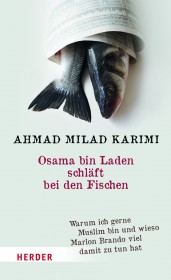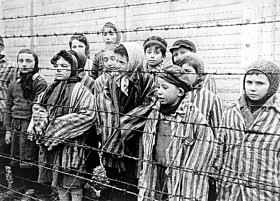“New German Stories,” an event series launched in January 2014 as part of the Academy program, continues this evening, 10 March 2015, when Ahmad Milad Karimi, Professor of Islamic Philosophy and Mysticism at the University of Münster, presents his new book Osama bin Laden is sleeping with fishes (Osama bin Laden schläft bei den Fischen) at the Academy of the Jewish Museum Berlin. We put three questions to our guest, prior to the event.

Ahmad Milad Karimi: Osama bin Laden is sleeping with fishes (Bookcover) © Herder Publishers
Julia Jürgens: Dear Mr. Karimi, in your autobiography you bring together Western popular culture and the history of Islamic intellectualism, the translation of the Koran and your PhD thesis on Hegel, Persian mysticism and a penchant for mafia films. If I may make a question of your book’s subtitle: What does Marlon Brando have to do with the pleasure you take in being Muslim?
Ahmad Milad Karimi: That is a secret of the book, a secret concealed first and foremost by the fact that there is always more to people than the pigeonhole we like to keep them in.
Six years ago you published your new translation of the Koran. What motivated you to take up such a challenge and add a new translation to those already in existence?
The Koran is more than simply a book—it is → continue reading

“A ceremony with friends and family”: The bris of Jaal, photo: William Noah Glucroft
In the last few weeks at “Blogerim” we have reported on the discussions that the subject of circumcision can prompt. We shouldn’t lose sight, though, of the fact that the ritual is a matter of course for most Jewish and Muslim families – as, for example, for Amitay and Meital from Israel. I asked the couple what their son Yaal’s bris was like for them.
In mid-December you had Yaal circumcised by a mohel at the Fraenkelufer Synagogue. Did you have to think about it for a long time?
Meital: For me, there was no question.
Amitay: Same here. But when the time approached, I did have some questions.
→ continue reading

Surviving children in the main concentration camp, Auschwitz. This still from documentary footage shot by Alexander Voronzow shows Tomasz Szwarz, Alicja Gruenbaum, Solomon Rozalin, Gita Sztrauss, Wiera Sadler, Marta Wiess, Boro Eksztein, Josef Rozenwaser, Rafael Szlezinger, Gabriel Nejman, Gugiel Appelbaum, Mark Berkowitz, Pesa Balter, Rut Muszkies, Miriam Friedman, and Miriam and Eva Mozes. Licensed for the public domain by the United States Holocaust Memorial Museum.
Seventy years ago to this day, the Soviet Army liberated the death camps Auschwitz I and II. Almost ten years ago, the anniversary was designated International Holocaust Remembrance Day. Although I’ve been reflecting on representations of the Holocaust in art, literature, and philosophy for many years, I remain irritatingly little affected by today’s date, January 27. In most European countries, official events will once again collectively recall that breach of civilization and commemorate those who were systematically murdered. So too will Germany. Here, the decision to officially commemorate the victims of the Holocaust on this day was reached in 1996—not least because → continue reading


